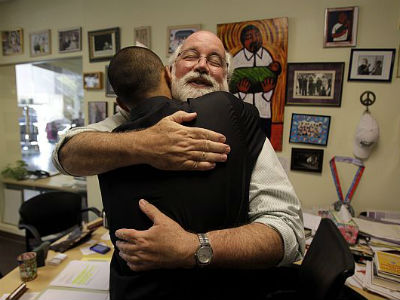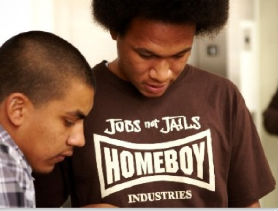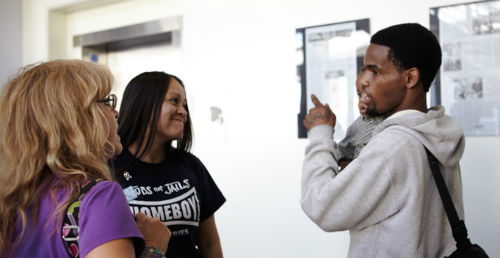By Neil Earle

DUARTE, CA. The Zimmerman Trial was supposed to ignite another “conversation on race” which soon turned into another feverish short-lived shouting match on the turmoil and chaos in some inner cities.
The media serves us poorly at such times. Gangs, gang warfare, gang violence – here are three of America’s most tragic afflictions and the blood draws the camera crews like fireflies. At last count there were about 11,000 gangs with 80,000 members and 1100 in my city of Los Angeles alone.
The scope of the problem is seemingly such that it is hard for parents, teachers, pastors and community leaders to even get a handle on the problem, let alone generate solutions. But hold on. There is a hopeful strategy out there that’s working. Anyone who’s heard of Father Gregory Boyle (pictured, right) and his Homeboy Industries knows what I am talking about. A Jesuit priest decided in 1988 to light a candle rather than curse the darkness.
I heard him speak at the Duarte Festival of Authors in Westminster Gardens a couple of years back. I know that even atheists in the crowd were touched by his sensible and compassionate voice beginning to cut through some of the pervasive fog.
Homeboy Industries was started in his Boyle Heights Parish in 1988 to create positive alternatives for gang-threatened youth. What began as an elementary school/day-care/job-finding mission in the poorest parish in Los Angeles took off after the civil unrest of 1992. It is now a multi-scaled enterprise that provides training, work opportunities and counseling (and yes, tattoo removal) for rival gang members working side by side. Homeboy Bakery, Homeboy Silkscreen, Homeboy Maintenance, etc. are the visible manifestations of an “intervention” that is seen as a model across the country.

Fr. Boyle likes to quote Mother Theresa: “We’ve forgotten that we belong to each other.”
Separation, he stated in Duarte, is an illusion. “There’s always been US, not I or Them but US.” Service, in Homeboy’s vision, is the hallway to the Grand Ballroom, but the Ballroom itself is Kinship. Kinship is but Father Boyle’s way of stressing the essential message of Jesus in his John 17 prayer, “That they all may be one.”
With that strong theological underpinning, Homeboys developed the vision of serving each other as “enlightened witnesses” – returning people “back to themselves,” to all of us made in God’s image, made in “the shape of God’s heart.” This healthy outlook dismantles the messages of shame and disgrace, “the negative tapes” Father Boyle’s young people have heard all their lives.
Steve Lopez of the LA Times met Stephanie Lane on a tour of the Homeboys complex. Stephanie had joined a gang, spent 2½ years in juvenile lockup and was going nowhere fast. Her grandmother said, “Go see Father Boyle.” In 2011 Stephanie was slated to head up the new Homegirl Café at City Hall. “Father Boy made all this happen,” she told Lopez. “He never judged us the way everybody does.”

Boyle was inspired by Sister Elaine Roulette, founder of My Mother’s House in New York. She was asked, “How do you work with the poor?” She answered: “You don’t. You share your life with the poor.”
“We’re all more similar than different,” Boyle told us in Duarte.
“Hopeful kids don’t join gangs,” Father Boyle continued. “Recruits are always fleeing something. Gang violence is always about something else. For many kids life is a misery and misery loves company. When kids set out as shooters some night, for example, they’re not so much interested in shooting the target as they are at being killed themselves.”
Seems hard to believe but we now know that gang members commonly publish their own obituaries on Facebook. They know it’s only a matter of time until…These are hard-hitting insights but they set up what some might see as an even more bold insight: “Gangs are not a crime issue per se,” Boyle told us, “but a community health issue with law-enforcement aspects.” Thus Father Boyle doesn’t believe too much in negotiating with gangs or even gang-to-gang negotiation as between Hamas and Israel in the Middle East, for example.
No. This, he maintains, simply validates the gang structures. “Not gangs but gang members” is his preferred approach. “They’ll come through my doors when they’re ready. No amount of me wanting then to have a life can best me wanting them to have a life.”
Homeboys continues to deal with what he calls “a lethal absence of hope” in the face of funding cutbacks that led to the layoff of 330 of 427 employees in May, 2011. That corner was significantly turned when $3.5 million came in in 45 days. Father Boyle believes in the old adage that prevention is better than cure. “Keeping kids out of detention saves the system $1.6 million per year. That’s a bargain.”
Among the overflow crowd in Duarte, some of them sporting tattoos, students from Duarte High School, America’s Promise, and DART representatives were hanging on Boyle’s every word. He knew how to hold attention. Possessor of a droll sense of humor, Father Boyle amused audiences with the escapades of three young men invited to accompany him to a White House conference and reception hosted by First Lady Laura Bush. It was time to wear a suit! Yes, a suit!
When actress Diane Keaton showed up at one of his cafes a brash young waitress insisted she had seen her famous customer somewhere before. When Keaton tried to brush it off with clam modesty the waitress-with-attitude retorted: “I know. I know. We were locked up together.”
Such anecdotes and more pepper Boyle’s memoir Tatoos on the Heart which is available at Amazon.com. One of the best strategies for working with teens and the drug problem is to provide them with real, genuine, honest-to-God role models. Maintain a positive expectation and surround them with good influences and thousands of teens can be helped along the road to a new life. So one of the ways to cope with negative media overkill is to think of Homeboy and Homegirls, go to the grocery store, buy a bag of their tortilla chips and pass them around to your friends. The logo reads, “Jobs not Jail.” And tell them, “It works!”
Neil Earle is a pastor and journalist who hosts Duart, Califonia’s Cable Television commentary “A Second Look.”